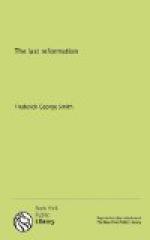But all of Rome’s boasted catholicity, centralized in an official, administrative corporation, is a chimera; for it is a fact that multitudes are accepted of God as members of the divine family who are not identified with the hierarchy. The real catholic church, embracing the whole spiritual brotherhood, is therefore something else.
[Sidenote: Main source of ecclesiasticism]
But we have not yet reached in this discussion the tap-root of the evil tree of human ecclesiasticism. The fundamental error underlying all other errors on this subject, was the idea of an absent Christ. Notwithstanding the definite assertions of our Lord, “I am with you alway, even unto the end of the world” and “Where two or three are gathered together in my name, there am I in the midst of them”—notwithstanding these reassuring promises and the definite statements of the apostles which represent Christ as the ever-living and ever-acting head of the church, soon after the apostolic period men lost the consciousness of the divine presence and began to think and to act as if Christ were indeed absent and would not return again for thousands of years. The presence of gigantic evils in the world with no apparent available means of redressing them, the dead weight of heathenism, and the disturbing influences of speculative Oriental philosophies impressed upon the conscience of the world a despairing pessimism. In the midst of this trial there was a revival of the Platonic philosophy. The treatise of Plato that made the most profound impression upon the religious thought of the second century was the “Timaeus,” wherein the Deity is pictured as withdrawn from the world into a distant heaven separated from all creation because of the evil with which matter is essentially connected. With God withdrawn from the world and Christ absent on a long journey, what was man to do? What was the hope of the world?
Here ecclesiasticism found its real opportunity. Here human authority and government could be and was substituted for that spiritual dominion of Christ which gave life, form, and character to his church in primitive days. Here grew up that conception of the church as identical with the hierarchy whose power and authority was handed down by direct descent from the apostles and without whose priestly mediation there was no hope of salvation. Here was introduced




